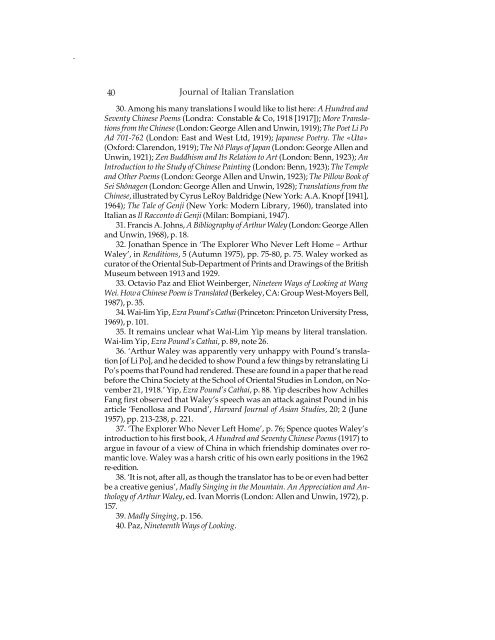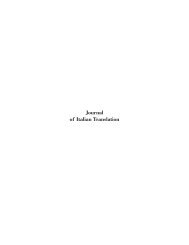Journal of Italian Translation
Journal of Italian Translation
Journal of Italian Translation
You also want an ePaper? Increase the reach of your titles
YUMPU automatically turns print PDFs into web optimized ePapers that Google loves.
40 <strong>Journal</strong> <strong>of</strong> <strong>Italian</strong> <strong>Translation</strong><br />
30. Among his many translations I would like to list here: A Hundred and<br />
Seventy Chinese Poems (Londra: Constable & Co, 1918 [1917]); More <strong>Translation</strong>s<br />
from the Chinese (London: George Allen and Unwin, 1919); The Poet Li Po<br />
Ad 701-762 (London: East and West Ltd, 1919); Japanese Poetry. The «Uta»<br />
(Oxford: Clarendon, 1919); The Nô Plays <strong>of</strong> Japan (London: George Allen and<br />
Unwin, 1921); Zen Buddhism and Its Relation to Art (London: Benn, 1923); An<br />
Introduction to the Study <strong>of</strong> Chinese Painting (London: Benn, 1923); The Temple<br />
and Other Poems (London: George Allen and Unwin, 1923); The Pillow Book <strong>of</strong><br />
Sei Shônagen (London: George Allen and Unwin, 1928); <strong>Translation</strong>s from the<br />
Chinese, illustrated by Cyrus LeRoy Baldridge (New York: A.A. Knopf [1941],<br />
1964); The Tale <strong>of</strong> Genji (New York: Modern Library, 1960), translated into<br />
<strong>Italian</strong> as Il Racconto di Genji (Milan: Bompiani, 1947).<br />
31. Francis A. Johns, A Bibliography <strong>of</strong> Arthur Waley (London: George Allen<br />
and Unwin, 1968), p. 18.<br />
32. Jonathan Spence in ‘The Explorer Who Never Left Home – Arthur<br />
Waley’, in Renditions, 5 (Autumn 1975), pp. 75-80, p. 75. Waley worked as<br />
curator <strong>of</strong> the Oriental Sub-Department <strong>of</strong> Prints and Drawings <strong>of</strong> the British<br />
Museum between 1913 and 1929.<br />
33. Octavio Paz and Eliot Weinberger, Nineteen Ways <strong>of</strong> Looking at Wang<br />
Wei. How a Chinese Poem is Translated (Berkeley, CA: Group West-Moyers Bell,<br />
1987), p. 35.<br />
34. Wai-lim Yip, Ezra Pound’s Cathai (Princeton: Princeton University Press,<br />
1969), p. 101.<br />
35. It remains unclear what Wai-Lim Yip means by literal translation.<br />
Wai-lim Yip, Ezra Pound’s Cathai, p. 89, note 26.<br />
36. ‘Arthur Waley was apparently very unhappy with Pound’s translation<br />
[<strong>of</strong> Li Po], and he decided to show Pound a few things by retranslating Li<br />
Po’s poems that Pound had rendered. These are found in a paper that he read<br />
before the China Society at the School <strong>of</strong> Oriental Studies in London, on November<br />
21, 1918.’ Yip, Ezra Pound’s Cathai, p. 88. Yip describes how Achilles<br />
Fang first observed that Waley’s speech was an attack against Pound in his<br />
article ‘Fenollosa and Pound’, Harvard <strong>Journal</strong> <strong>of</strong> Asian Studies, 20; 2 (June<br />
1957), pp. 213-238, p. 221.<br />
37. ‘The Explorer Who Never Left Home’, p. 76; Spence quotes Waley’s<br />
introduction to his first book, A Hundred and Seventy Chinese Poems (1917) to<br />
argue in favour <strong>of</strong> a view <strong>of</strong> China in which friendship dominates over romantic<br />
love. Waley was a harsh critic <strong>of</strong> his own early positions in the 1962<br />
re-edition.<br />
38. ‘It is not, after all, as though the translator has to be or even had better<br />
be a creative genius’, Madly Singing in the Mountain. An Appreciation and Anthology<br />
<strong>of</strong> Arthur Waley, ed. Ivan Morris (London: Allen and Unwin, 1972), p.<br />
157.<br />
39. Madly Singing, p. 156.<br />
40. Paz, Nineteenth Ways <strong>of</strong> Looking.

















